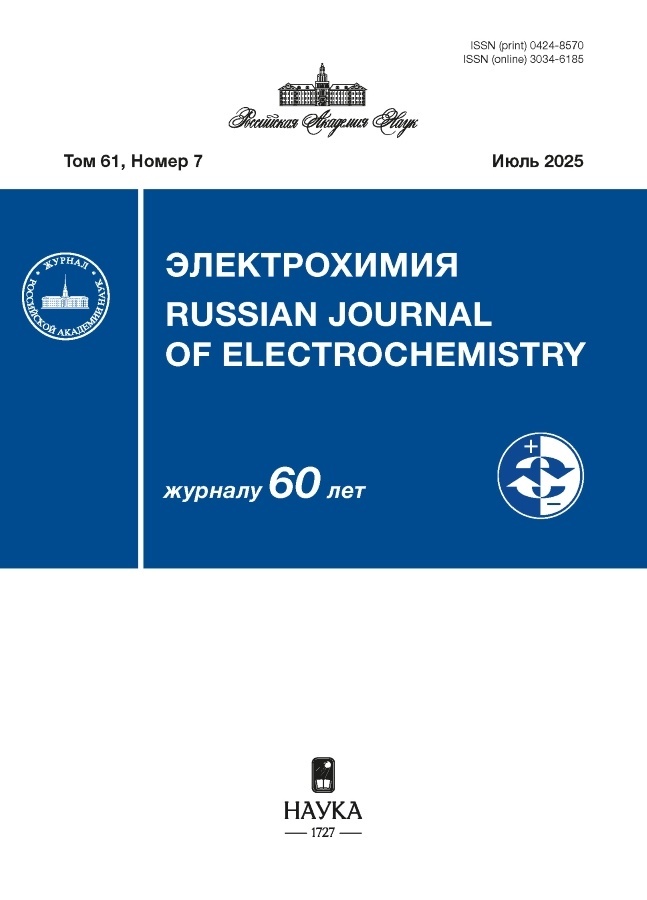Electrochemical energy converters in decentralized power systems
- Authors: Nefedkin S.I.1, Isaev Y.V.1, Mikhnevich V.D.1, Yeletsky V.E.1, Klimova M.A.1
-
Affiliations:
- National Research University “MPEI”
- Issue: Vol 60, No 12 (2024): Special issue “Electrochemistry-2023”, part 3
- Pages: 841–854
- Section: Articles by participants of the All-Russian Conference “Electrochemistry-2023” (Moscow, October 23–26, 2023)
- URL: https://modernonco.orscience.ru/0424-8570/article/view/677977
- DOI: https://doi.org/10.31857/S0424857024120041
- EDN: https://elibrary.ru/NNCPQR
- ID: 677977
Cite item
Abstract
Considered electrochemical energy converters, which are used depending on the type, both for the generation of electric energy and for its accumulation in the form of chemical energy of active substances. An example of an alternative scheme for guaranteed electricity and heat supply of an energy-isolated facility with high wind power potential and hydrogen energy storage without the use of imported or local fuel is considered. The scheme contains a wind power complex from a park of wind generators located in high-potential wind points, which provide guaranteed electricity supply even during periods of low wind. For the heat supply of the consumer all surplus electricity goes to thermoelectric heating of water in storage tanks, as well as hydrogen production by electrolysis of water. Hydrogen is stored or goes into the fuel cell power plant (used in a period of calm or as a backup power source), also when the heat is lacking in the hydrogen condensing boiler. For a real autonomous facility (Novikovo village, Sakhalin island) the annual hydrogen energy balance is calculated, the number of wind generators, parameters used in the equipment scheme, also the installed capacity utilization factors. The main prerequisites for implementation of an alternative electricity and heat supply scheme without use of imported fuel at the expense of wind energy and electrochemical conversion of energy are shown.
Full Text
About the authors
S. I. Nefedkin
National Research University “MPEI”
Author for correspondence.
Email: nefedkinsi@mpei.ru
Russian Federation, Moscow
Ya. V. Isaev
National Research University “MPEI”
Email: nefedkinsi@mpei.ru
Russian Federation, Moscow
V. D. Mikhnevich
National Research University “MPEI”
Email: nefedkinsi@mpei.ru
Russian Federation, Moscow
V. E. Yeletsky
National Research University “MPEI”
Email: nefedkinsi@mpei.ru
Russian Federation, Moscow
M. A. Klimova
National Research University “MPEI”
Email: nefedkinsi@mpei.ru
Russian Federation, Moscow
References
- International Renewable Energy Agency. https://www.irena.org/ IRENA. Accessed June 26, 2024.
- https://techxplore.com/news/2024-01-spain-generated-power-renewables.html. Accessed June 26, 2024.
- Nova Wind. https://novawind.ru/production. Accessed June 2, 2024.
- Atomic expert. https://atomicexpert.com/novawind_rosatom. Accessed June 26, 2023.
- Водородная энергетика: учебник / Н.В. Кулешов, С.К. Попов, С.В. Захаров [и др.]; под ред. Н.В. Кулешова. М.: Изд-во МЭИ, 2021. 547 с. [Hydrogen energy: textbook / N.V. Kuleshov, S.K. Popov, S.V. Zakharov [and others]; edited by N.V. Kuleshov: MPEI Publishing House, 2021. – 547 p.] ISBN 978-5-7046-2438-7
- Нефедкин, С.И. Автономные энергетические установки и системы: М.: Изд-во МЭИ, 2018. 220 с. ISBN 978-5-7046-1847-8 [Nefedkin, S.I., Autonomous power plants and systems: M.: MPEI Publishing House, 2018. 220 p.]
- Коровин, Н.В. Топливные элементы и электрохимические энергоустановки/ Н.В. Коровин. М.: Изд-во МЭИ, 2005. 280 с. [Korovin, N.V. Fuel cells and electrochemical power plants: M.: MPEI Publishing House, 2005. 280 p.]
- Fuel Cell Systems Explained, Third Edition. Andrew L. Dicks and David A.J. Rand. John Wiley & Sons Ltd. Published, 2018, 496 р. ISBN: 978-1-118-70696-1
- Topler, J. and Lehmann J.(eds.), Hydrogen and Fuel Cell, Springer-Verlag Berlin Heidelberg, 2016, 391 р. https://doi.org/10.1007/978-3-662-44972-1
- Химические источники тока: Справочник. Под ред. Н.В. Коровина, А.М. Скундина. М.: Изд-во МЭИ, 2003. 740 с. [Chemical sources of current: Handbook / Edited by N.V. Korovin, A.M. Skundin. M.: MPEI Publishing House, 2003. 740 p.] ISBN 5-7046-0899-х
- Volfkovich, Yu.M., Supercapacitors: problems and prospects of development, Russ. Chem. Rev., 2022, vol. 91(8), RCR5044. htps://doi.org/10.1070/RCR5044
- Afif, A., et al., Advanced materials and technologies for hybrid supercapacitors for energy storage, a review, J. Energy Storage, 2019, vol. 25, 100852. https://doi.org/10.1016/j.est.2019.100852
- Cicconi, Р. and Kumar, Р., Design approaches for Li-ion battery packs: A review, J. Energy Storage, 2023, vol.73, Part D, 109197. https://doi.org/10.1016/j.est.2023.109197
- Kulkarni, Р., Jung, H., Ghosh, D., Jalalah, M., Alsaiari, M., Harraz, F.A., and Balakrishna, R. G., A comprehensive review of pre-lithiation/sodiation additives for Li-ion and Na-ion batteries, J. Energy Chem., 2023, vol. 76, р. 479. https://doi.org/10.1016/j.jechem.2022.10.001
- Попель, О.С. Современные виды электрохимических накопителей электрической энергии и их применение в автономной и централизованной энергетике. Теплоэнергетика. 2020. № 11. С. 2. [Popel, O.S., Modern types of electrochemical electrical energy storage devices and their application in autonomous and centralized energy, Thermal power engineering, 2020, no. 11, p. 2.]
- Craddock, E., Cuéllar-Franca, R., Pérez-Page, M., The incorporation of 2D materials into membranes to improve the environmental sustainability of vanadium redox flow batteries (VRFBs): A critical review, Curr. Opin. Chem. Eng., 2023, vol. 40, 100906. https://doi.org/10.1016/j.coche.2023.100906
- Lourenssen, K., Williams, J., Ahmadpour, F., Clemmer, R., and Tasnim, S., Vanadium redox flow batteries: a comprehensive review, J. Energy Storage, 2019, vol. 25, Article 100844. https://doi.org/10.1016/j.est.2019.100844
- Konno, N., Mizuno, S., Nakaji, H., and Ishikawa, Y., Development of Compact and High-Performance Fuel Cell Stack, SAE Int., J. Alt. Power, 2015, vol. 4 (1), р. 123. https://doi.org/10.4271/2015-01-1175
- Market Research Future Source. https://www.marketresearchfuture.com. Accessed June 12, 2023.
- Grigoriev, S.A., Fateev, V.N., Bessarabov, D.G., and Millet, P., Current status, research trends, and challenges in water electrolysis science and technology, Int. J. Hydrogen Energy, 2020, vol. 45, р. 26036. https://doi.org/10.1016/j.ijhydene.2020.03.109
- Nel hydrogen. https://nelhydrogen.com. Accessed March 2, 2024.
- Григорьев, С.А. Обратимые электрохимические системы с твердым полимерным электролитом. Электрохим. энергетика. 2009. Т. 9. № 3. С. 128. [Grigoriev, S.A., Reversible electrochemical systems with solid polymer electrolyte, Electrochemical energy, 2009, vol. 9, no. 3, p. 128.]
- Bernal-Agustin, J.L. and Dufo-Lopez, R., Hourly energy management for grid-connected windehydrogen systems, Int. J. Hydrogen Energy, 2008, vol. 33, p. 6401. https://doi.org/10.1016/j.ijhydene.2008.08.026
- Garcia, P., Torreglosa, J.P., Fernandez, L.M., and Jurado, F., Optimal energy management system for stand-alone wind turbine/photovoltaic/hydrogen/battery hybrid system with supervisory control based on fuzzy logic, Int. J. Hydrogen Energy, 2013, vol. 38, р. 14146. http://dx.doi.org/10.1016/j.ijhydene.2013.08.106
- Solarpanel today. https://solarpanel.today/top-5-programs-for-modeling-solar-power-plants. Accessed March 1, 2024.
- https://web.archive.org/web/20121002195722/http://alternativenergy.ru/raschet-vetrogeneratora.html.Accessed March 12, 2024.
- Etap. https://etap.com/ru/product/wind-turbine-generator-software. Accessed March 2, 2024.
- Etap. https://etap.com/ru/solutions/gridco. Accessed March 2, 2024.
- Энергетический бюллетень. М: Аналитический центр при Правительстве РФ, 2017. № 49. С. 27. [Energy Bulletin. M: Analytical Center under the Government of the Russian Federation, 2017, no. 49, 27 р.]. http://ac.gov.ru/files/publication/a/13570.pdf
- Лазарев, А.Н., Захаренко, В.А., Меньшенин, А.Л., Гром, Ю.И., Сергеев, Г.С. Автономная ветродизельная электрическая установка мощность 10кВт. Вопросы электромеханики. 2015. Т. 148. С. 43. [Lazarev, A.N., Zakharenko, V.A., Menshenin, A.L., Grom, Yu.I., and Sergeev, G.S., Autonomous wind-diesel electric installation with a power of 10 kW, Questions of electromechanics, 2015, vol. 148, p. 43.]
- Попель, О.С. Возобновляемые источники энергии: роль и место в современной и перспективной энергетике. Рос. хим. журн. (Ж. Рос. хим. об-ва им. Д.И. Менделеева), 2008, Т. LII, № 6. С. 95. [Popel, O. S., Renewable energy sources: role and place in modern and promising energy, Russian Chemical Journal (J. Russian Chemical Society named after D.I. Mendeleev), 2008, vol. LII, no. 6, р. 95.]
- NASA. https://power.larc.nasa.gov. Accessed June 22, 2018.
- Нефедкин, С.И., Барсуков, А.О., Мозгова, М.И., Шичков, М.С., Климова, М.А. Автономное энергоснабжение с использованием ветроэнергетического комплекса и водородного аккумулирования энергии. Альтернативная энергетика и экология (ISJAEE). 2019. Т. 16–18. С. 12. [Nefedkin, S.I., Barsukov, A.O., Mozgova, M.I., Shichkov, M.S., and Klimova, M.A., Autonomous energy supply using a wind energy complex and hydrogen energy storage, Alternative Energy and Ecology (ISJAEE), 2019, vol. 16–18, p. 12.] https://doi.org/10.15518/isjaee
- Беляков, П.Ю. Ветроэнергетика: теоретические основы и технические решения: Учеб. пособие. Изд-во: Международный институт компьютерных технологий. Воронеж. 2007. 121 с. [Belyakov, P. Yu., Wind energy: theoretical foundations and technical solutions. Tutorial. Publisher: International Institute of Computer Technologies. Voronezh, 2007, 121 p.] ISBN: 5-98858-012-2
- «Welcome to Cool Prop – cool Prop 6.4.3 documentation”. http://www.coolprop.org/index.html. Accessed June 22, 2023.
- https://www.komaihaltec.co.jp/ Accessed June 22, 2018.
- Heat leader. https://lidertepla.ru. Accessed July 29, 2023.
- Giacomini. https://static.giacomini.com/giacomini.com/catalog/technical_documentation/CCF01.pdf. Accessed July 20, 2023.
Supplementary files














